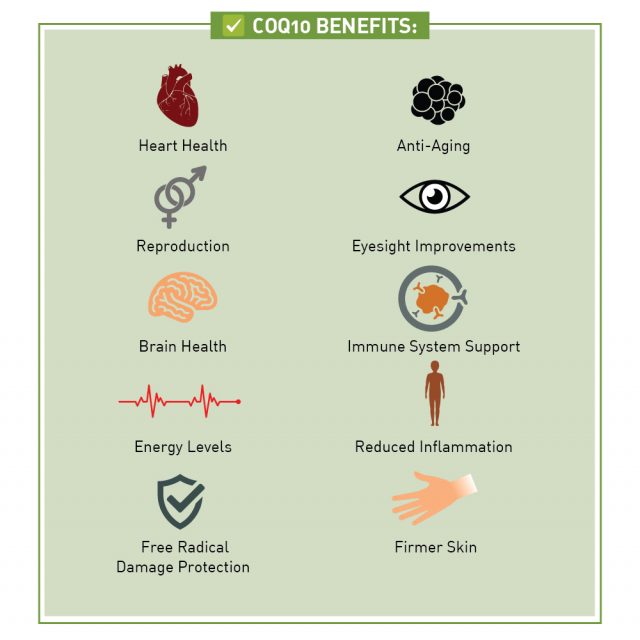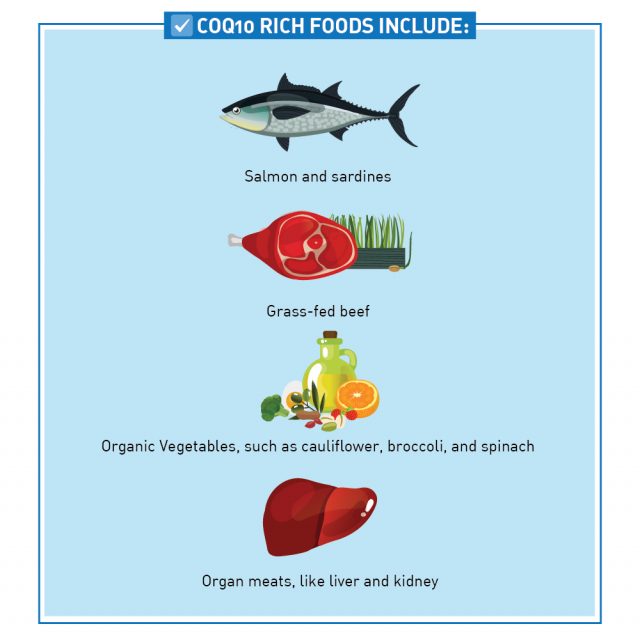

By Dr. Justin Marchegiani
CoQ10, also known as ubiquinone or ubiquinol, is short for Coenzyme Q10. There are a few supplements that just about everyone would benefit from, and CoQ10 makes that list.
Not only does CoQ10 work as an antioxidant, helping to break down free radicals, and as a ‘coenzyme’ helping to break down food— it also plays a crucial role in the production of ATP, the energy currency of life.
You may be familiar with mitochondria as “the powerhouse of the cell. In order for our bodies to make use of the food we eat, our mitochondria has to turn food and oxygen into useable energy in the form of ATP. This conversion process requires the presence of CoQ10.

Why is CoQ10 so essential for your health? Evidence is showing benefits for:
Heart Health: While further trials are pending, we’ve seen promising evidence for preventing and treating heart conditions. Studies suggest that taking CoQ10 may be able to prevent recurring heart attacks: In one study, patients who took CoQ10 within 3 days of having a heart attack were able to reduce chest pain and chance of another attack.
Additionally, one review of CoQ10 stated it “has potential for use in prevention and treatment of cardiovascular disease, particularly hypertension, hyperlipidemia, coronary artery disease, and heart failure.”*
Would you benefit from CoQ10 supplementation? Click here to get 1-on-1 support!
Reproduction: In men struggling with infertility, CoQ10 was shown to help by improving sperm count & quality. *
Lowers Inflammation: CoQ10 has shown an ability to lower two markers of inflammation, NT-proBNP and gamma-glutamyl transferase (an early marker for heart failure). Inflammation is commonly referred to the “root of all modern disease,” so lowering inflammation is powerful for preventing autoimmune disease, neurocognitive decline, and other markers of aging.
Firmer Skin: CoQ10 can help with the production of collagen and elastin, the proteins responsible for making your skin flexible and firm. Topical products may not contain enough active CoQ10, so it’s better to get this coenzyme internally.
Energy Levels: We’ve already learned that CoQ10 plays a vital role in the production of cellular energy, or “ATP.” In addition to this vital role, coenzyme q10 has been shown to help with energy levels post-workout. *
Protection From Free Radical Damage: Also known as oxidative stress, free radical damage is a power to be reckoned with, and a major factor of aging. CoQ10 is one of the first antioxidants on the scene when LDL is oxidized, and can even protect membranes against oxidation in the first place.
Brain Health: There is potential for CoQ10 to treat mitochondrial disorders and neurological diseases, such as Parkinson’s and ALS (amyotrophic lateral sclerosis). Additionally, a 2014 study showed that those with higher levels of CoQ10 were 77% LESS likely to develop dementia. *,*
Some coenzyme Q10 is actually produced naturally in your mitochondria, but natural production tends to decline with age.

Try incorporating more CoQ10-rich foods into your diet. CoQ10 rich foods include:
An easy way to ensure you’re getting the benefits of CoQ10 daily would be by taking it in supplement form. One pill (100mg) per day is generally a good maintenance dose, though depending on your health status and goals you may take more. For example, if you are trying to prevent or treat brain fog or dementia. Work with your functional medicine practitioner to determine your personal CoQ10 strategy.

Need help solving the underlying cause of your health issues? Click here!